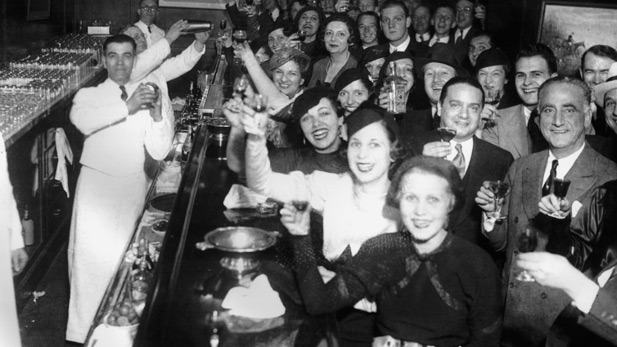Gangsters make huge profits and wreak havoc in cities across the country. By the late 1920s, many Americans believe that Prohibition — the “Noble Experiment” — has failed. After the election of FDR in 1932, Prohibition is repealed.
 Chicagoans celebrate the repeal of Prohibition at the Congress Hotel on December 8, 1933. One lasting effect of Prohibition: men and women seen drinking together.
Chicagoans celebrate the repeal of Prohibition at the Congress Hotel on December 8, 1933. One lasting effect of Prohibition: men and women seen drinking together.The wealthy Pauline Sabin begins publicly decrying that Prohibition has divided the nation into “wets, drys, and hypocrites.” Nearly a century before, women had hoped Prohibition would make the country a safer place for their children. But by the late 1920s many American women believe that the “Noble Experiment” has failed. Sabin unifies women of all classes, refuting the notion that all women support Prohibition and denouncing the law itself as the greatest threat to their families. Sabin and others argue that repeal will bring in tax revenue and provide desperately needed jobs. After the election of Franklin D. Roosevelt in 1932, Congress easily passes the 21st Amendment, which repeals the 18th, and the states quickly ratify it. In December of 1933, Americans can legally buy a drink for the first time in 13 years.
Part 3 of 3, Tuesday at 8 p.m. on PBS-HD.

By submitting your comments, you hereby give AZPM the right to post your comments and potentially use them in any other form of media operated by this institution.